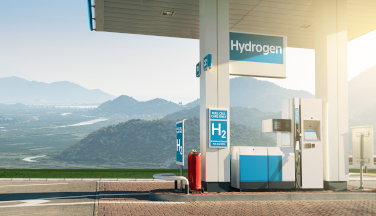Jump-Starting the “Hydrogen Economy”
Heavy-duty demand will be a key driver of hydrogen fuel production and infrastructure development


In an earlier article, we discussed the emergence of hydrogen-powered internal combustion engines (ICEs) in the race to develop cleaner alternatives to fossil fuels and meet regulatory carbon-reduction mandates. Many participants in the heavy-duty industry, including fleet operators and prominent OEMs, view hydrogen or H2 engine fuel as the most promising “bridge” technology to decarbonization. Cummins, a leading heavy duty engine manufacturer, estimates that the conversion of medium and heavy-duty trucks from gas or diesel to hydrogen could eliminate about a quarter of all greenhouse gas emissions attributed to transportation in the U.S.
Interest in hydrogen technology has generated buzz around the concept of a “hydrogen economy” – the ecosystem of hydrogen production, distribution and usage that is integral to a zero-emission future. Growing demand for hydrogen in heavy-duty transportation has the potential to jump-start the hydrogen economy and speed the development of fuel production and the necessary fueling infrastructure.
That is not to say that hydrogen ICEs are the “silver bullet” or the ultimate solution for decarbonization. The future of transportation energy will likely entail a mix of technologies, prominently including H2, but also renewable natural gas, battery electrification, biofuels, and hydrogen fuel cells.
While manufacturers around the world have made substantial commitments to develop battery electric vehicles (BEV), many OEMs and regulatory bodies are concerned that the transition to BEVs cannot happen quickly. It will require not only the rapid scaling up of manufacturing, but also a widespread charging infrastructure and a robust energy grid capable of supporting the added demand. In contrast, H2 ICEs represent a more streamlined, faster transition technology for manufacturers and operators of heavy duty, long-haul diesel trucks. The hydrogen-fuel engine architecture is fundamentally similar to that of a diesel engine and can provide similar driving range. Hydrogen engines are also seen as equally durable and reliable to diesel and natural gas engines. For many OEMs and fleets, the transition to a mix of diesel and hydrogen is already underway. Likewise, similar engine architecture will allow OEMs to more easily adapt their existing engine production facilities to the manufacture of hydrogen-powered ICEs.
Hydrogen fuel cells for electric vehicles (FCEVs) have made in-roads in the light-duty and passenger car sectors, with three models on the road and another in development. For the heavy-duty market, however, H2 fuel cell production and replacement costs are likely to drive up the total cost of ownership. Moreover, H2 ICEs have the potential for a better driving range than BEVs or FCEVs, a major concern for on-highway fleet operators.
Chevron is one of the global energy producers that is well positioned to be a leader in the hydrogen economy and a supplier of hydrogen fuel for a variety of applications, including heavy duty transportation. Chevron currently produces around one million tons of hydrogen for propulsion applications each year. We have been investing in hydrogen R&D for decades and currently hold more than 80 patents that are applicable to our hydrogen development roadmap. On the lubricant side of the business, we are actively working on oil formulations that address the nuances of hydrogen and other alternative fuels, with the goal of developing “fuel-agnostic” solutions that will support the heavy-duty energy mix of the near future.
11/02/2023

























